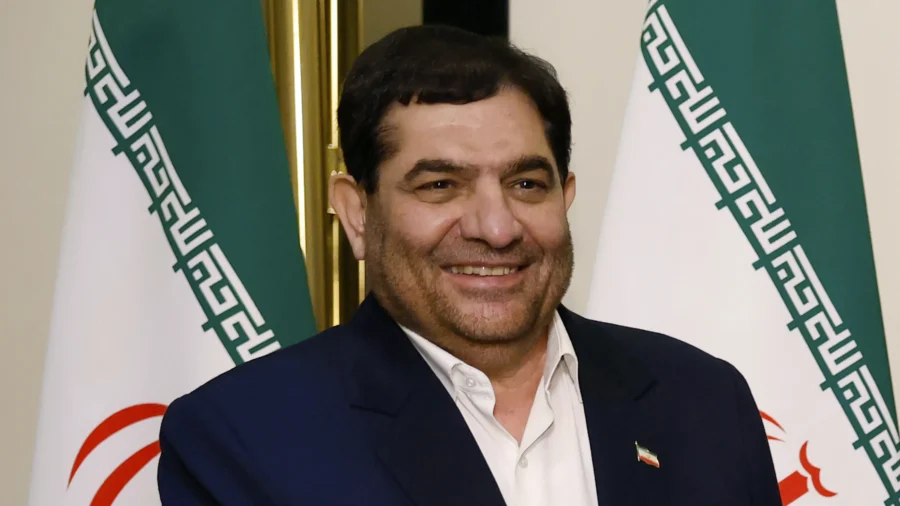With the May 19 death of Iranian President Ebrahim Raisi, Mohammad Mokhber became the interim president of the Islamic Republic.
In accordance with Iran’s constitution, there will be elections within 50 days.
However, whether Mr. Mokhber, 68, will have the interim label removed as Iran’s election is to be determined and far from guaranteed.
The Iranian presidency is a four-year term with a consecutive two-term limit.
Gabriel Noronha, who worked on Iran policy in the Trump administration, told The Epoch Times: “He is a caretaker—the election to succeed Raisi has been scheduled for a month from now.
“He isn’t necessarily positioned to win that role, typically his job is more to manage operations inside the government.”
Ilan Berman, senior vice president of the American Foreign Policy Council, which is in Washington, echoed Mr. Noronha.
“He does not have any other mandate but to stay the course, and continue pursuing the policies authorized by the Supreme Leader and put in place by Raisi,” Mr. Berman told The Epoch Times.
However, he said, Mr. Mokhber could make the case to succeed Mr. Raisi on a permanent basis if he remains loyal to Ayatollah Ali Khamenei, who essentially has the ultimate say in who will be the successor.
Another possible candidate to replace Mr. Raisi is Mohammad Ghalibaf, the speaker of Iran’s parliament.
Unlike Mr. Mokhber, Mr. Ghalibaf has not been sanctioned by the United States.
Previously, Mr. Mokhber was the seventh First Vice President of Iran (Iran has 12 vice presidents). He was appointed by Mr. Raisi to the position on Aug. 8, 2021.
“He has spent most of his career in managerial positions within Ali Khamenei’s business empire and as a close adviser to him and his office,” said Saeed Ghasseminejad, an Iran expert at Washington think tank the Foundation for Defense of Democracies, to The Epoch Times.
“We will see a continuation of previous policies and total submission of the executive branch to the supreme leader and orders coming from his office.”
“Raisi was known for his ultra-Islamist and fanatical views on religion, society, politics and countering dissent, but Mokhber is not as zealot,” Ahmad Hashemi, a research fellow at the Washington-based Hudson Institute, told The Epoch Times.
But “there will be more continuity than change. Strategic decisions are made by the supreme leader. The president is an implementer,” Jason Brodsky, policy director of United Against Nuclear Iran, told The Epoch Times.
Mr. Mokhber ran Mr. Khamenei’s hedge fund Setad, or EIKO, and his conglomerate Bonyad Mostazafan.
The United States sanctioned the former entity on Nov. 18, 2020, and the latter on Jan. 13, 2021, when Washington also sanctioned Mr. Mokhber—just seven days before President Joe Biden took office.
But, noted Mr. Berman: “Mokhber has a comparatively lower profile. He is still an insider—before assuming the role of acting president, he was Iran’s first vice president.
“However, he doesn’t have either the notoriety or the stigma that Raisi did.”
Mr. Raisi, who was sanctioned by the United States in 2019, was known as the “Butcher of Tehran” for ordering the executions of thousands of Iranians in 1988.
Nonetheless, said Mr. Ghasseminejad: “Mokhber is corrupt and played a key role in Tehran’s disastrous response to the COVID pandemic,” where there were well over 100,000 deaths from the virus.
“He forced Iranians to use a vaccine developed by one of the subsidiaries of Khamenei’s business empire, run by Mokhber himself, by obtaining an order from Khamenei that banned the import of vaccines developed in the West,” he said.
“Many Iranians died as a result of this decision.”
While the president of Iran is a notable position as the highest-elected position in Iran, the ultimate succession to look out for is who will be the next ayatollah after Mr. Khamenei, 85, dies or were he to resign.
Mr. Raisi was seen as Mr. Khamenei’s successor but now it is uncertain who will lead the regime, though it could be Mr. Khamenei’s son, Mojtaba Khamenei.
“Now that [Mr. Raisi] is no longer in the picture, there will be a great deal of activity on the part of the Iranian regime to solidify and clarify succession for the country’s top post,” said Mr. Berman.
Mr. Mojtaba Khamenei, who was sanctioned by the United States in 2019, leads the Basij, a paramilitary unit of Iran’s Islamic Revolutionary Guard Cops, which is a U.S.-designated terrorist group.
However, the aftermath of Mr. Raisi’s death could make the regime vulnerable and inspire further protests by dissenters.
“As Iran has declared five days of mourning in memory of President Ebrahim Raisi, the regime is concerned about the likelihood that masses may take into streets to celebrate Raisi’s death in coming days or interrupt his official mourning processions when the regime tries to display to the world an optics of a solidarity, union, and popularity in the face of this tragedy,” said Mr. Hashemi.
From The Epoch Times

